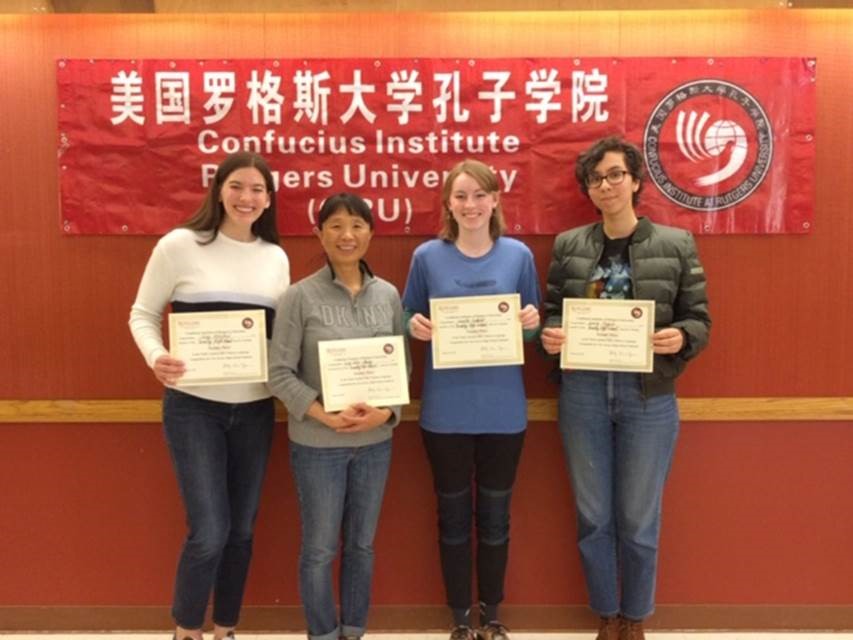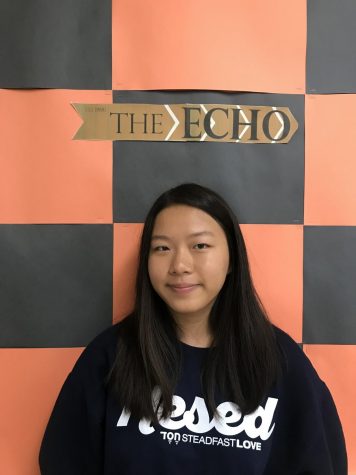Three Senior Non-Native Speakers Win Rutgers Chinese Competition
Chloe Altschul (’19), Ms. Sung, Camille Lederer (’19), and Cemre Tugcu at the Confucius Institute of Rutgers University Chinese Language Completion for NJ High School Students
April 29, 2019
On March 30th, Rutgers University held the Confucius Institute of Rutgers University Chinese Language Completion for NJ High School Students, at which three Tenafly High School seniors won second place overall.
Chloe Altschul, Cemre Tugcu, and Camille Lederer, accompanied by Chinese teacher Ms. Sung, attended the competition. The team went around the six stations of the competition, where they were tested on different aspects of Chinese proficiency, such as pronunciation, writing, reading, and conversation. Some stations, such as storytelling, were team efforts, but others, like writing, were performed separately. The Tenafly team performed extremely well at the competition, being only a decimal point away from the winning team’s score.
Learning a language non-native to you is a skill that requires patience, diligence, and practice. Tenafly Public Schools offer Spanish, Italian, French, and Chinese. Mandarin Chinese, which is the language that Tenafly Middle School and Tenafly High School teach, is an extremely complex language. It is a tonal language, where the intonation one puts on the word can change its entire meaning. Chinese is the most widely spoken language in the world, and nearly one billion people speak Mandarin Chinese.
Learning a foreign language, Mandarin Chinese in particular, is a skill that isn’t done overnight, according to Chinese teacher Ms. Sung. “It’s all built up from four years,” says Sung. “It’s not that they practiced for the competition; their skills were built up throughout the years of learning, and teaching them for the past years is how I was able to choose them for the competition because I know their abilities.” Unlike French, Spanish, and Italian, Chinese has an entirely different alphabet with different characters that students need to memorize. Not only do they need to know the characters, they need to be sure to stress their tone; four different pronunciations of the sound “ma” give the sound four completely different meanings. “A primary difference [from Chinese and English] is the lack of a phonetic system, such that it is impossible to sound out new words,” said Chloe Altschul. Despite the struggles of learning the language, Altschul enjoys the challenge. “I think Chinese is fascinating,” she said. “Each character was derived from an ancient pictograph, thus leaving the current system of simplified characters with hints to the meaning of the word. Many characters include radicals, which is comparable to a vowel. There are radicals with different meanings. For example, the Chinese character for ‘river’ includes the radical which means ‘water,’ giving readers a direct clue as to the meaning of the original character.”
Foreign language classes offer a way for students to break language barriers in their future endeavors, whether it is being able to read airplane magazines while traveling overseas or communicating with foreign business partners. “I think that learning at least one other language is something that everyone should try to do,” said Camille Lederer. “It’s amazing to be able to communicate with different kinds of people using different sounds that have the same meaning.”
Taking the challenge to learn a new language also paves the way for more learning. “English is definitely versatile, but learning and becoming fluent in a language allows the student of it to think in a completely disparate way while understanding the culture of where it comes from much more deeply,” said Cemre Tugcu. “It definitely helps you when traveling abroad, and I’ve found that knowing more languages makes it easier to learn new ones.”


















































































































































